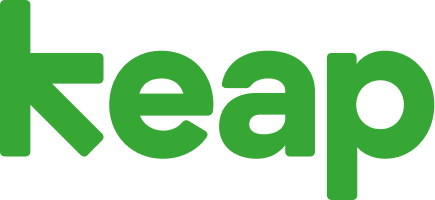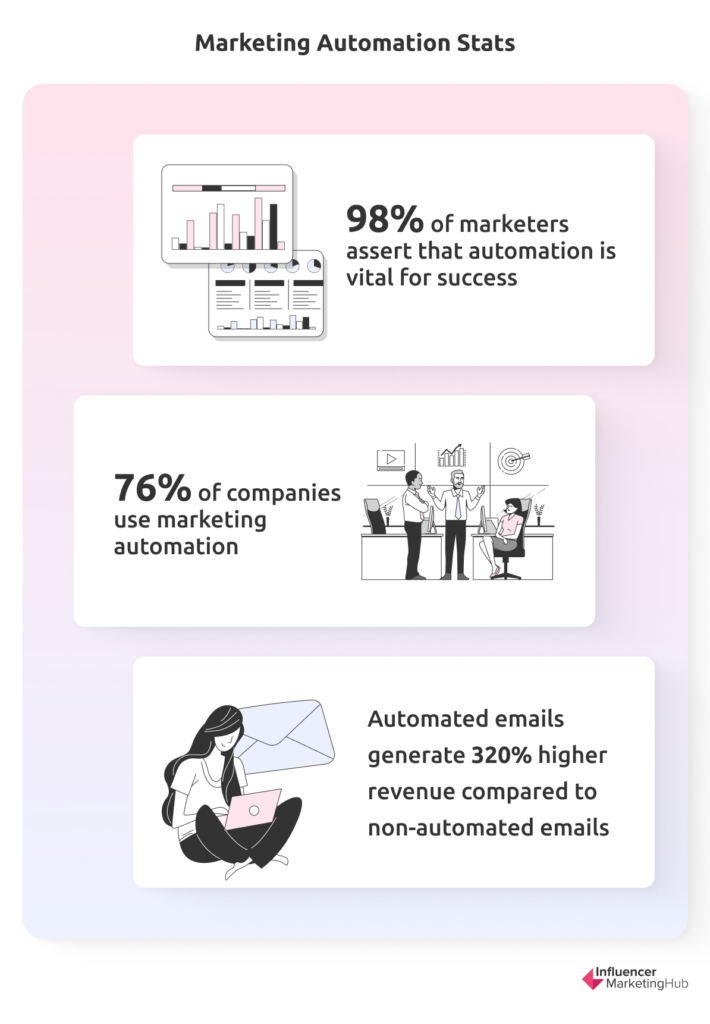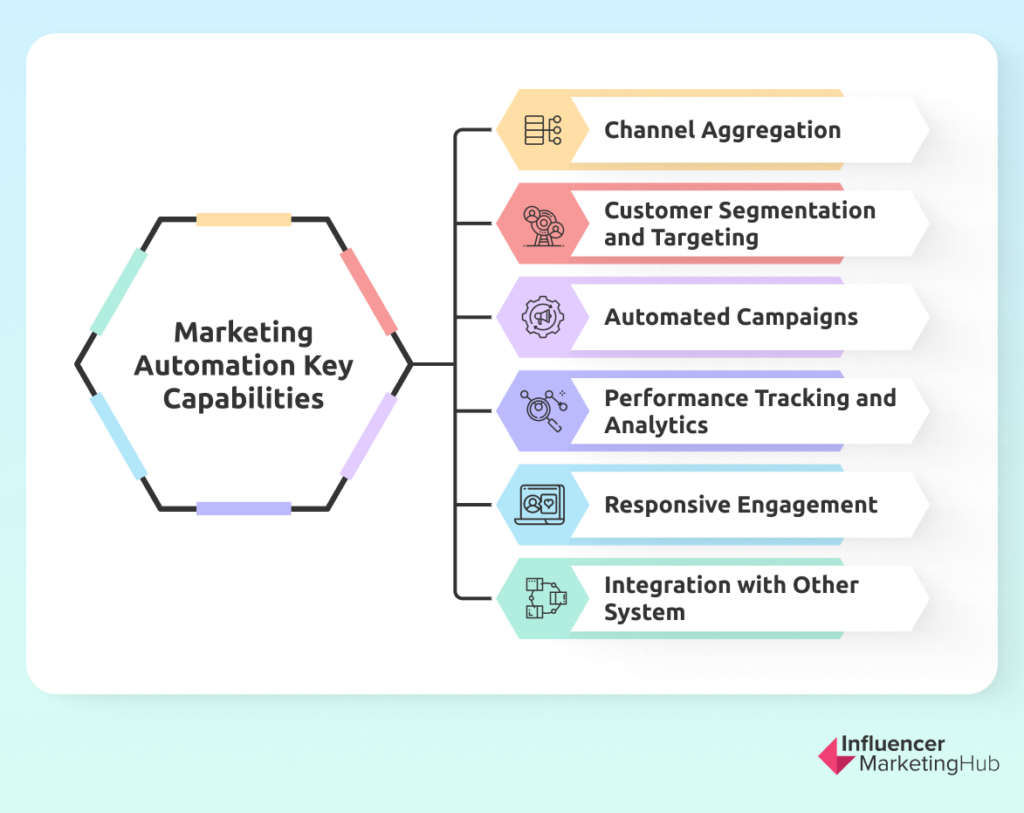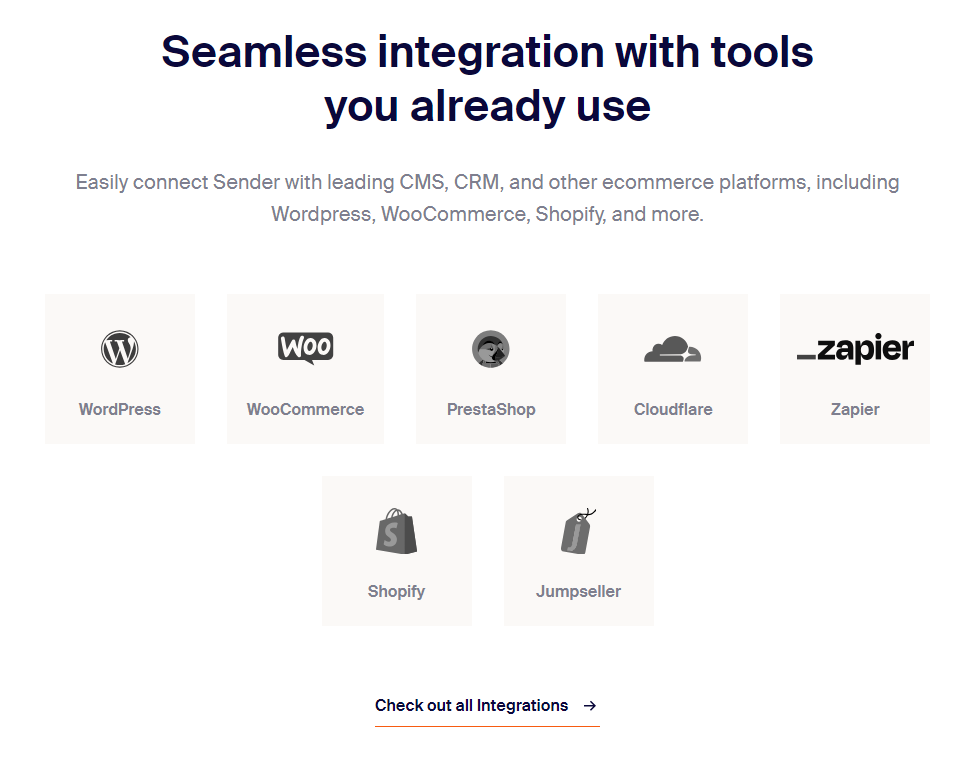Advertising disclosure:
Our partners compensate us. This may influence which products or services we review (also where and how those products appear on the site), this in no way affects our recommendations or the advice we offer. Our reviews are based on years of experience and countless hours of research. Our partners cannot pay us to guarantee favorable reviews of their products or services.
Marketing automation tools have become indispensable for businesses aiming to thrive. This article delves into the top 10 tools revolutionizing the marketing landscape. From personalized email campaigns to sophisticated customer journey mapping, these tools offer a plethora of features to elevate your marketing strategy. Whether you're a small startup or a large enterprise, understanding the nuances of these tools can be a game-changer in your business growth. Join us as we explore these innovative solutions that promise to transform your marketing efforts into a success story.
1. Brandwatch Social Media Management
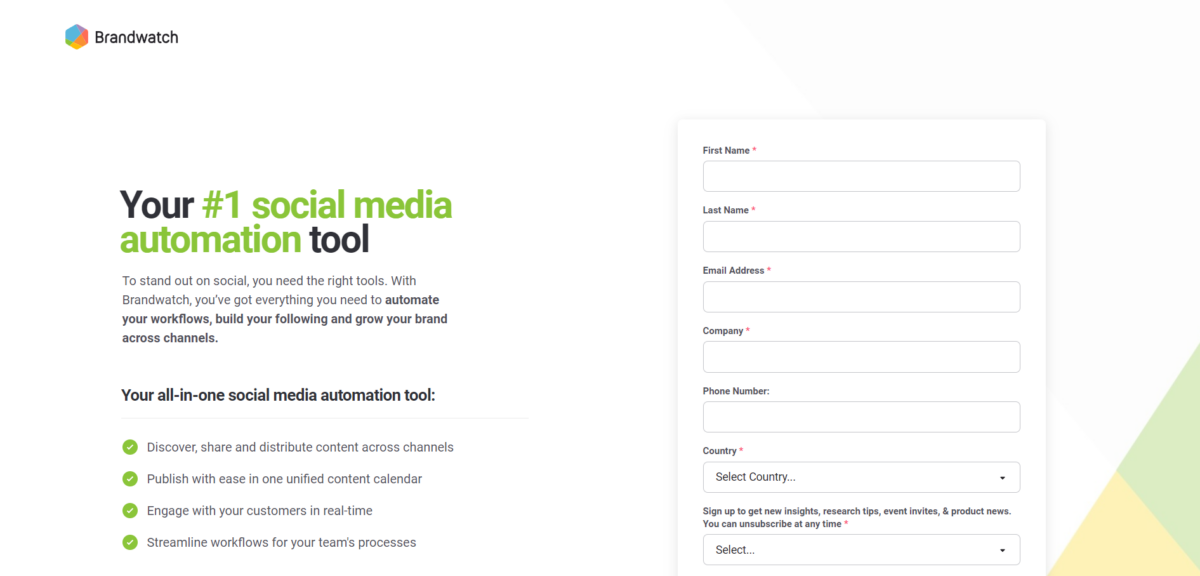
Pricing Info: Brandwatch offers customized prices available upon request.
Key Features:
- Deep Research: Anticipate consumer demand by analyzing numerous voices.
- Brand Monitoring: Stay updated with consumer opinions in a fast-paced digital environment.
- Content Creation: Develop a data-driven content strategy managed in a collaborative social content calendar.
- Consumer Engagement: Deliver excellent customer experiences by engaging with the right individuals at the right time.
- Trend Analysis: Access a large archive of consumer opinions to identify new trends using advanced AI.
- Content Collaboration: Manage channels, teams, and workflows to ensure brand alignment and quality.
- Threat Shielding: Monitor emerging threats from various sources and set up real-time alerts.
- Channel Management: Simplify community management and customer support across all channels.
With Brandwatch, you can revolutionize your approach to marketing automation, especially in social media advertising. This tool integrates your advertising with your broader social media strategies, offering a unified platform for managing both paid and organic campaigns. You’ll find its ability to test organic content and amplify it through paid advertising particularly useful, ensuring a cohesive marketing approach. Brandwatch’s intuitive interface and smart automation features will speed up your campaign setup, making it a time-efficient choice for your enterprise. You’ll benefit from real-time insights with over 100 paid metrics, aiding in your data-driven decision-making.
2. Loomly
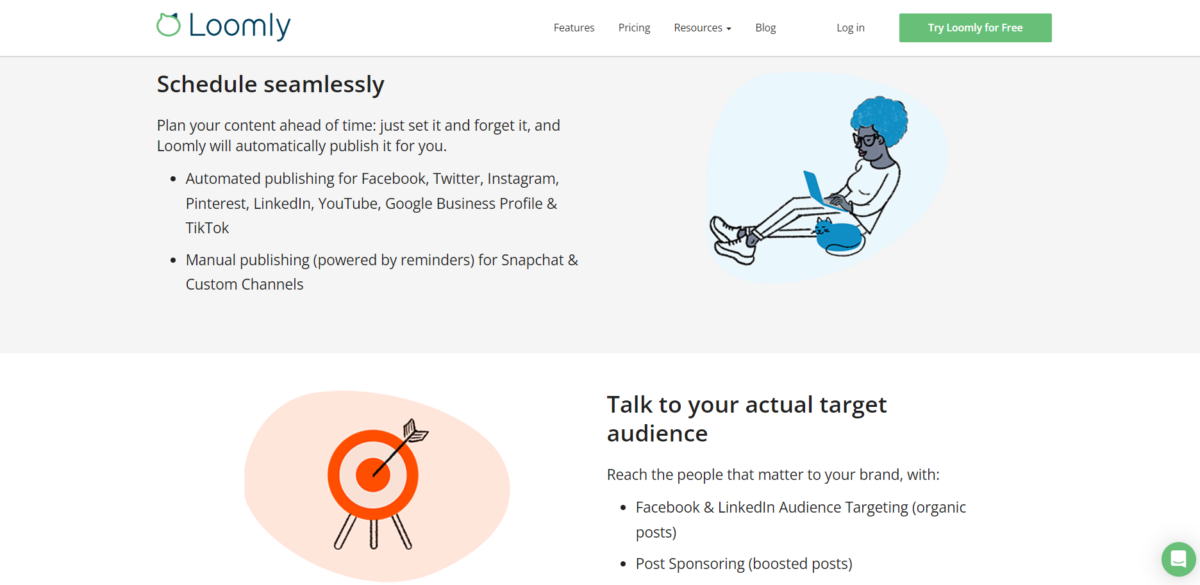
Pricing Info: Plans start at $32/month for two users and ten social media accounts.
Key Features:
- Social Media Calendar: Compatible with various social platforms, including Facebook, Twitter, Instagram, Google My Business, Pinterest, LinkedIn, TikTok, Snapchat, and YouTube.
- Content Creation & Publishing: Helps in creating and publishing social media content. It also provides a collaborative review and approval workflow for team collaboration.
- Brand Asset Management: Manage brand assets and control brand messaging with post mockups & approval.
Loomly will transform your marketing automation efforts with its user-friendly social media management tool. Designed to optimize your marketing efforts, you’ll get post ideas for inspiration, post optimization tips, and content previewing. Its automated publishing feature allows you to schedule posts in advance, streamlining your content management process. You’ll find the platform’s advanced analytics invaluable for measuring and enhancing performance. Loomly’s comprehensive toolset will save you time and improve your content quality, making it a top choice for enhancing your social media presence. The platform’s content library and interaction management tools will further bolster your utility in the marketing automation landscape.
3. Iconosquare
Pricing Info: Iconosquare offers a range of plans, starting with the Single Plan at €29/month (billed annually) for one user and three social profiles.
Key Features:
- Accurate Reporting: Allows for exporting selected social media insights for chosen time frames.
- Automated Publishing: Enables scheduling content in advance across multiple accounts.
- Enhanced Collaboration: Submit content for approval before publishing.
- Driving Conversations: Identifies unread comments and mentions for easy response.
- Social Listening: Offers tools to monitor audience feedback, competitor actions, and brand mentions.
Iconosquare excels in marketing automation by honing in on social media analytics and management across platforms like Instagram, TikTok, LinkedIn, Twitter, and Facebook. With over 100 metrics at your disposal, its analytics are thorough. Its intuitive interface and extensive toolset make it a solid choice for refining your social media strategies, offering streamlined processes and efficient conversation management to boost your social media performance.
4. Sender
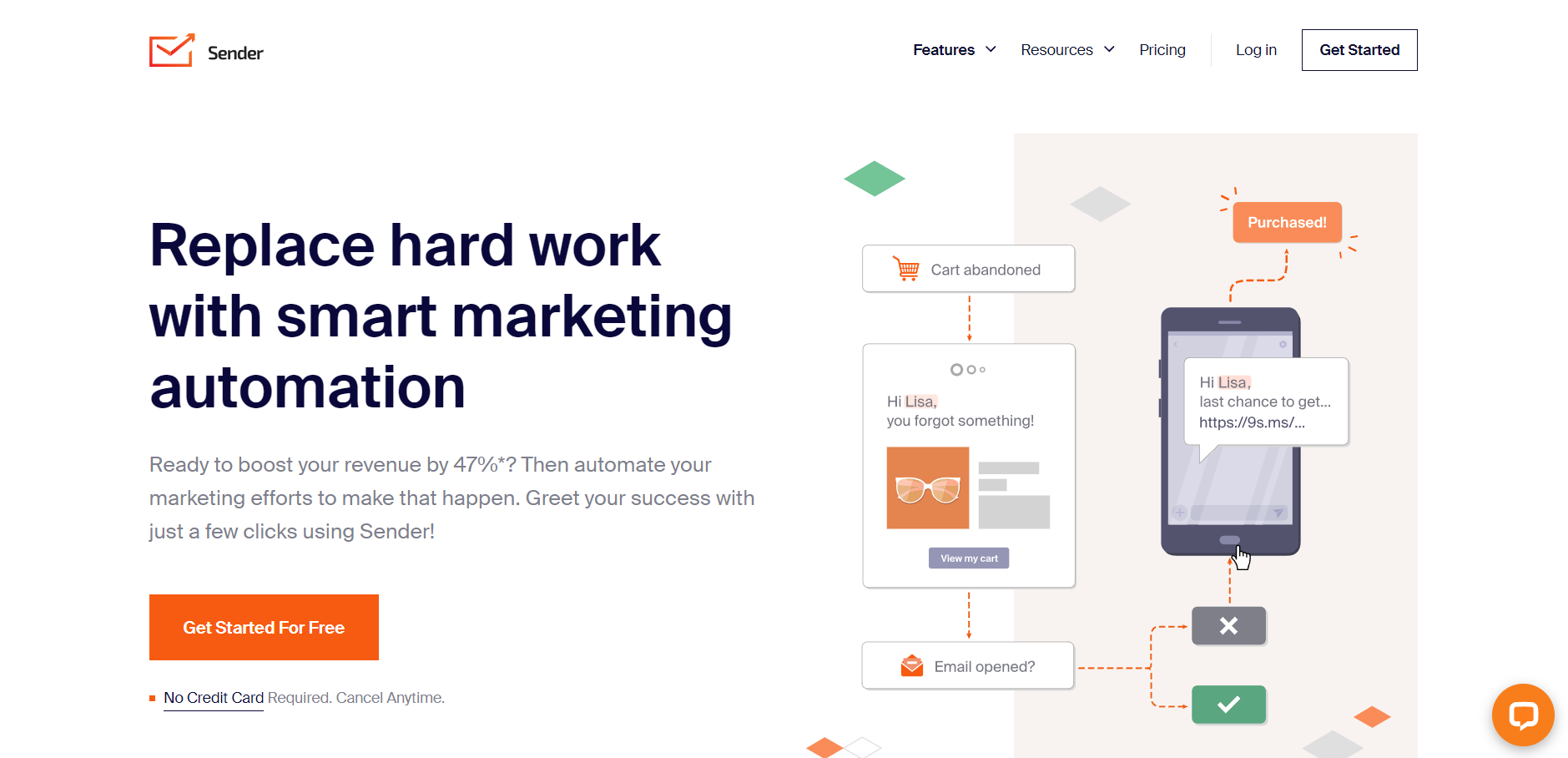
Pricing Info: Offers a free plan; paid plans start at $15.83/month for up to 30k emails and 2.5k subscribers.
Key Features:
- Omnichannel Marketing: Combines various channels for more effective campaigns.
- Marketing Automation: Offers automated email and text message sequences for improved campaign results.
- Audience Segmentation: Allows for targeted messaging through data-informed segmentation.
- Custom Fields & Personalization: Provides personalized messaging options.
- Seamless Integration: Easily integrates with various CMS, CRM, and eCommerce platforms like WordPress, WooCommerce, and Shopify.
As you explore marketing automation tools, consider Sender, a platform that excels in email marketing automation. With Sender, you can craft personalized email campaigns that resonate with your audience. The platform’s analytics provide insightful data, helping you refine your strategies for maximum impact. Regardless of your business size or type, Sender’s user-friendly interface and cost-effective plans make it an ideal choice for your marketing automation needs.
5. Ortto
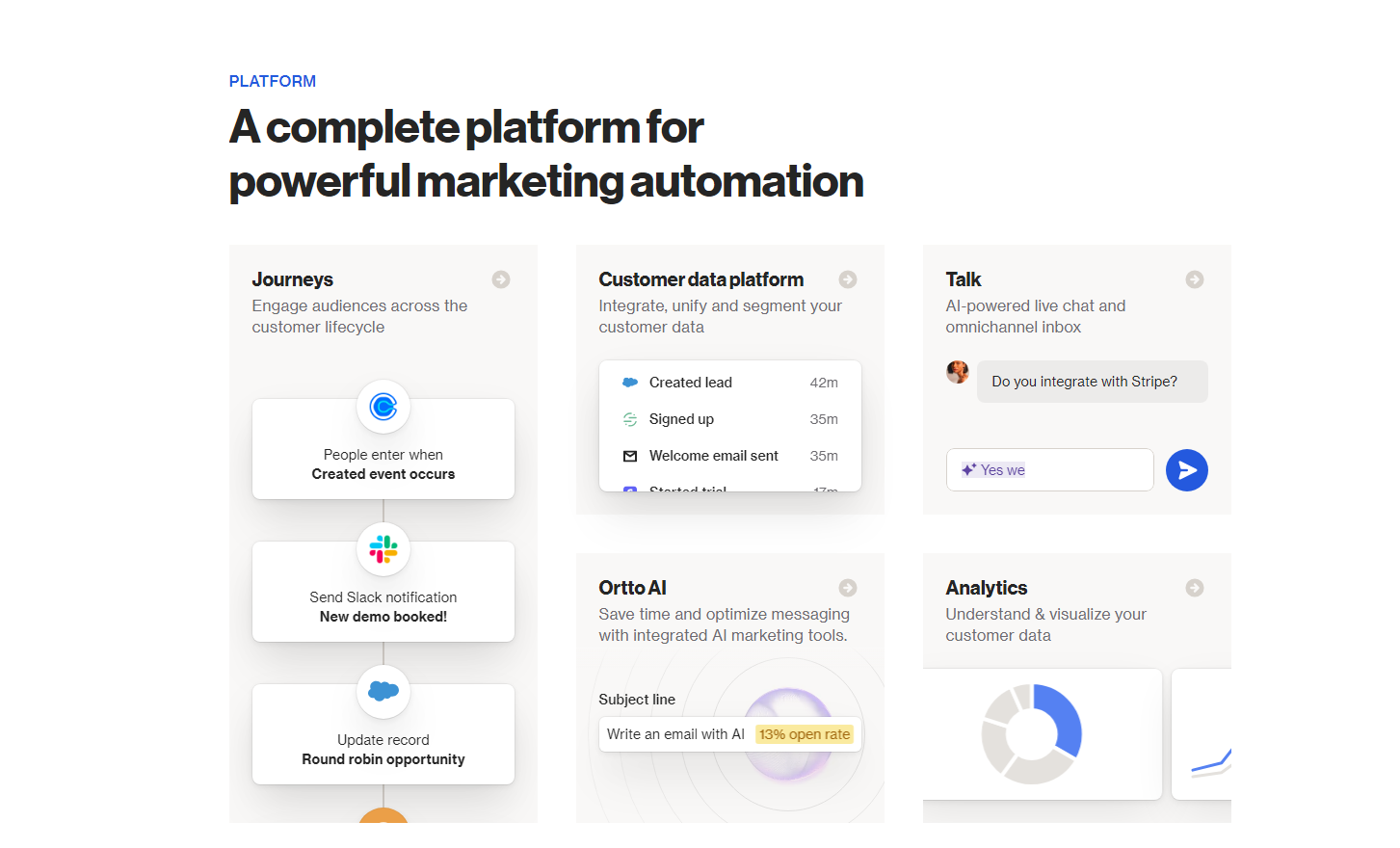
Pricing Info: Three pricing plans, beginning with Professional at $509/month (15% discount if paid annually) for 10,000 contacts.
Key Features:
- Customer Data Platform (CDP): Unifies and segments customer data.
- Journeys: Engages audiences across the customer lifecycle.
- Talk: Provides AI-powered omnichannel engagement.
- Analytics: Aids in understanding and visualizing customer data.
Ortto stands out in the realm of marketing automation tools with its robust marketing automation capabilities. It excels in crafting personalized customer experiences by utilizing integrated data from diverse sources, facilitating the execution of targeted marketing initiatives that are both potent and streamlined. This tool is especially advantageous for enterprises aiming to employ data-driven marketing strategies. Its campaign orchestration and customer segmentation utilities bolster its allure, presenting a well-rounded answer to your marketing automation requirements. With Ortto, campaigns transcend conventional boundaries, evolving into strategic conversations with your clientele.
6. ManyChat
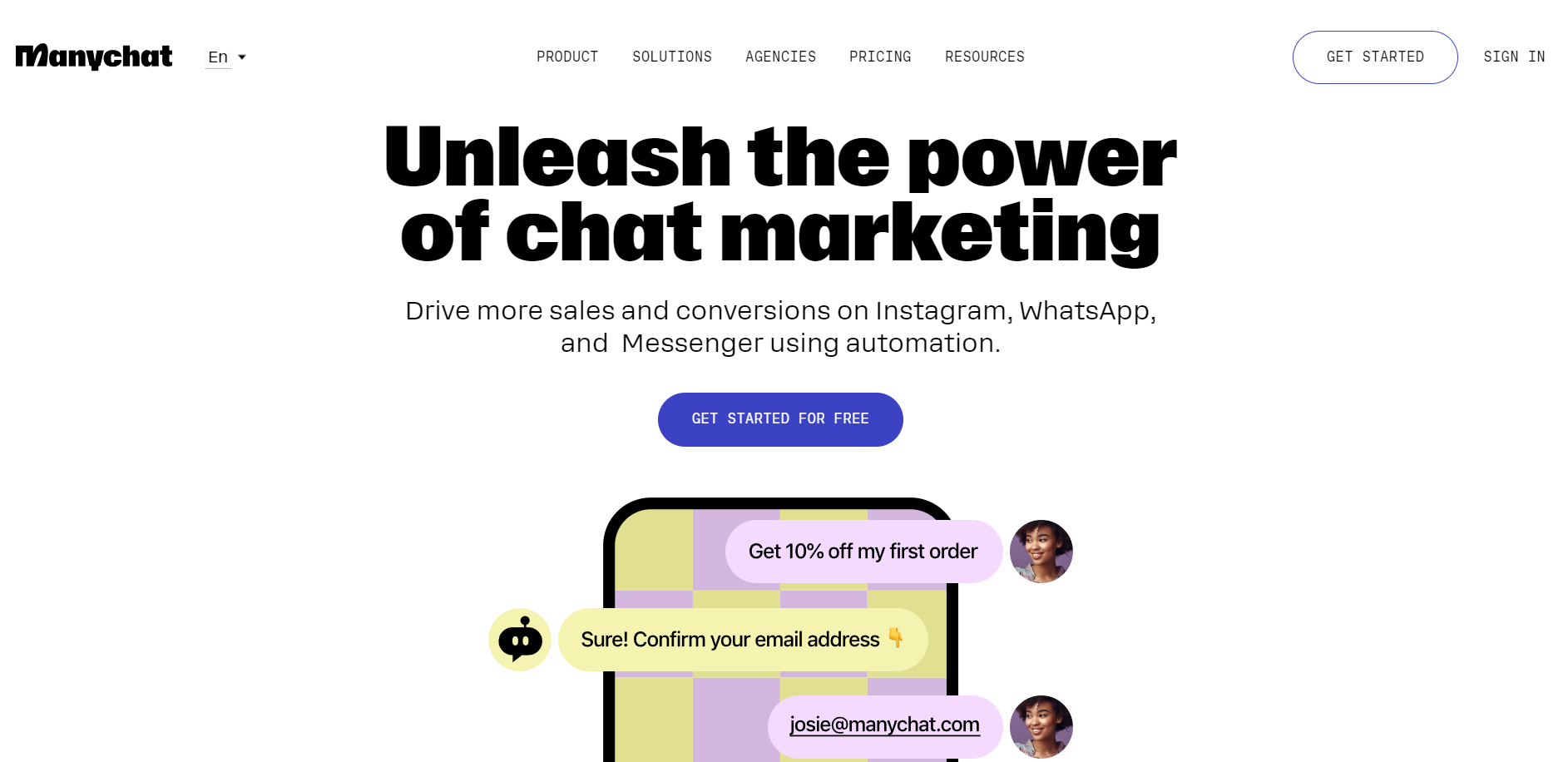
Pricing Info: Free plan available; paid plans start with Pro at $15/month.
Key Features:
- Lead Generation: Attracts and engages with customers, capturing email addresses and phone numbers.
- Conversion Rate Improvement: Identifies interested leads and reengages them.
- Automated Response: Automatically responds to each message, reaction, and mention.
- Time and Cost Efficiency: Automates responses to FAQs, streamlining communication.
- Ease of Use: Offers AI Assistant and plug-and-play templates for easy automation setup
ManyChat revolutionizes marketing automation tools with its focus on chatbot automation, especially for Facebook Messenger. This platform enables you to engage customers through automated chat sequences, offering an interactive and responsive experience. ManyChat simplifies the integration of chatbots into your social media strategy. With powerful features like SMS marketing, ManyChat is a go-to choice for businesses aiming to automate their social media tasks.
7. Keap
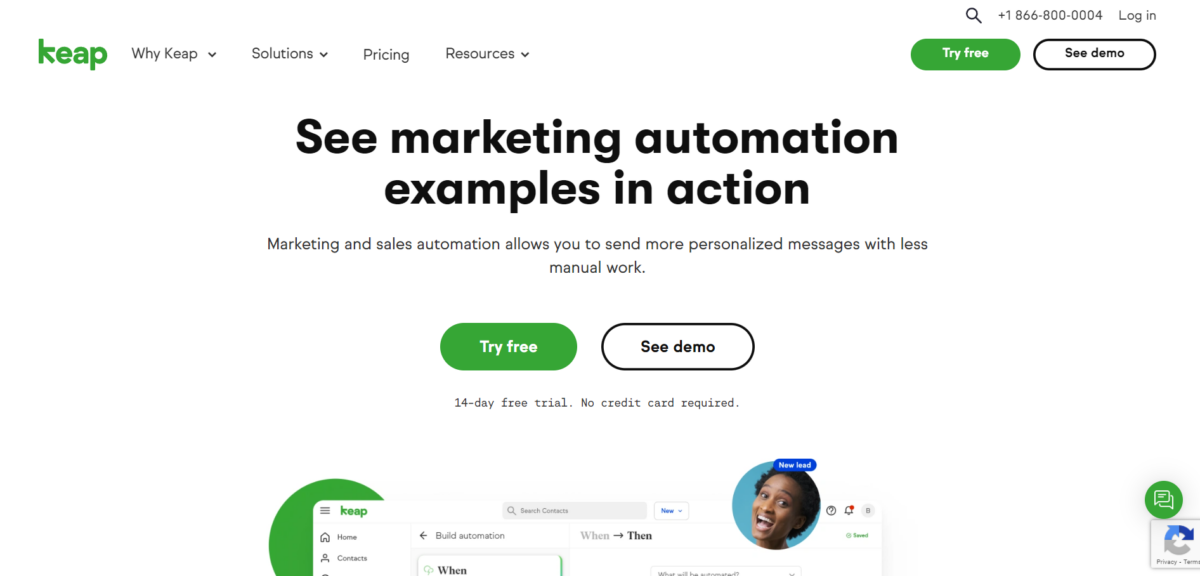
Pricing Info: Two plans, starting at $159/month for 1500 contracts. Try it for free for 14 days.
Key Features:
- Marketing Automation: Automates processes to save time and scale.
- Reporting: Tracks progress of marketing campaigns.
- Dedicated Mobile Number: Receives calls and texts.
- App Integration: Integrates business apps.
- Lead Capture and Management: Collects data via landing pages and forms and manages leads.
- Email and Text Marketing: Sends broadcasts, automations, and 1:1 emails and adds texts to automations.
- Sales Automation: Automates sales processes, including scheduling appointments and invoicing customers automatically.
- Referral Generation: Helps in getting referrals and reviews.
Keap, formerly known as Infusionsoft, offers a comprehensive marketing automation and CRM platform. It integrates email marketing, CRM, and eCommerce functionalities into a seamless experience. Keap’s strength lies in its extensive feature set and customization options, allowing you to tailor your marketing efforts to your unique business needs. Its ability to automate complex marketing tasks while providing detailed insights makes it a valuable asset for businesses seeking to grow and scale efficiently.
8. Drip
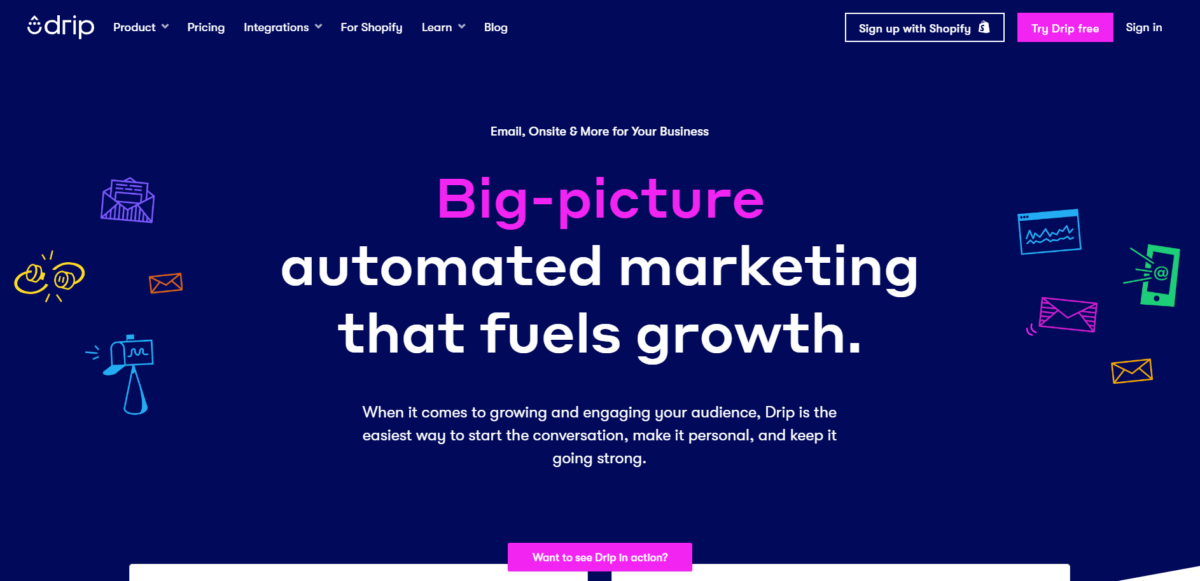
Pricing Info: 14-day free trial, pricing begins at $39/month for 2,500 contacts.
Key Features:
- Email Marketing: Design and send emails easily with ensured delivery and open rates.
- Onsite Campaigns: Create onsite campaigns using a drag-and-drop interface.
- Segmentation: Build behavior- and engagement-based segments using a variety of data.
- Automation: Run multichannel, evergreen marketing strategies on autopilot.
- Insights: View the impact of marketing strategies through detailed dashboards and adjust strategies for improved lifetime value.
Drip distinguishes itself among marketing automation tools with its customer-centric approach, focusing on email marketing and eCommerce automation. Drip’s analytics tool enables you to understand and cater to individual customer needs. Its features like personalization and customer journey mapping provide a holistic view of your customer interactions, allowing you to craft more effective and engaging marketing strategies. With Drip, you’re not just sending emails; you’re creating experiences that resonate with your customers and drive conversions.
9. MailModo
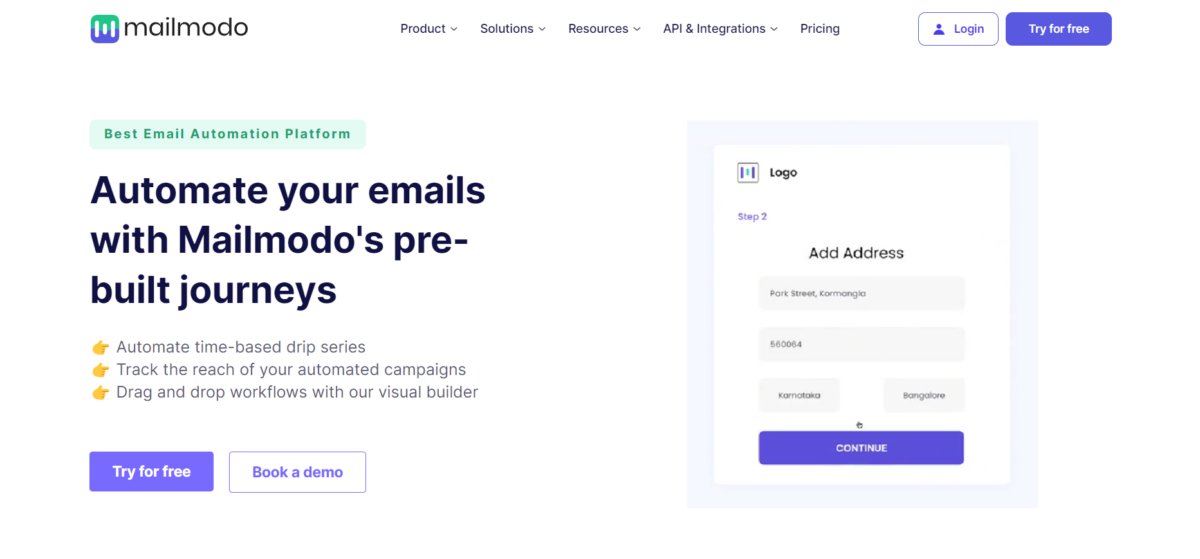
Pricing Info: 21-day free trial available; paid plans begin with Lite at $39/month for 2.5k contacts.
Key Features:
- Email Automation: Engage users across the lifecycle with email automation.
- Shopify Email Marketing: Drive sales with interactive emails throughout the buyer journey.
- Transactional Email: Trigger HTML and AMP emails with API and integrations.
- Contact Management: Better target emails with advanced contact management.
- Campaign Manager: Manage campaigns with a full-stack, intuitive manager.
- AI Capabilities: Save time on writing and template creation with AI.
- Bulk Email Campaigns, Triggered Campaigns: Conduct mass email campaigns and set up triggered email sequences.
- Advanced Segmentation: Segment contacts for targeted marketing efforts.
- In-depth Analytics: Analyze campaign performance with detailed analytics5.
MailModo offers a unique twist to marketing automation tools with its focus on interactive emails. This platform allows you to embed elements like polls, quizzes, and forms directly into your emails, significantly boosting engagement and conversion rates. Its AI-driven recommendations and AMP email capabilities ensure your campaigns are not only interactive but also highly effective. With MailModo, you’re transforming your email campaigns into dynamic and interactive experiences that captivate your audience and drive meaningful engagement.
10. SureTriggers
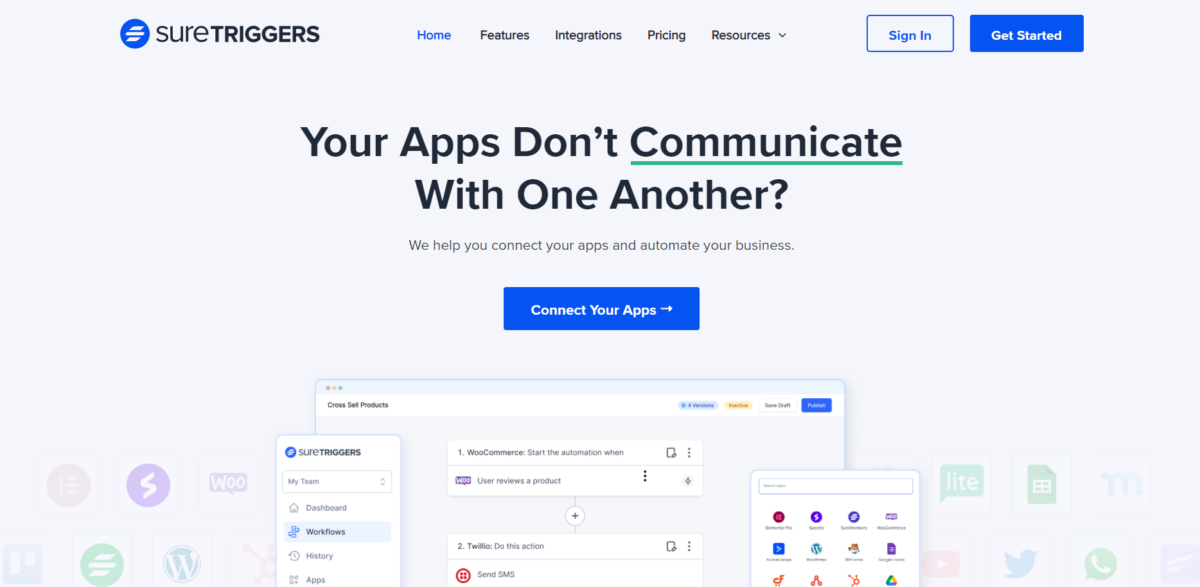
Pricing Info: Free plan available; paid plans start with Pro at $9/month. You can try the paid plans for 14 days for free.
Key Features:
- Precise Targeting: Enhances engagement with customers through targeted marketing.
- Automated Lead Scoring: Prioritizes leads automatically based on specified criteria.
- Multi-Channel Campaign Management: Enables campaigns to run across various channels seamlessly.
- Advanced Analytics: Provides insights for data-driven decisions to fine-tune marketing strategies.
- WordPress Integration: Facilitates automation involving events in WordPress, plugins, and third-party tools.
- Scheduling: Allows setting up automations to run at specific times, intervals, or dates.
SureTriggers is a versatile addition to your suite of marketing automation tools, specializing in workflow automation through app integration. It’s designed to automate repetitive tasks and streamline processes across different platforms. With its wide range of integrations and user-friendly interface, SureTriggers simplifies the automation of your business processes. Its customizable triggers and actions allow you to tailor automations to your specific business needs, ensuring your workflows are as efficient as possible.
The Role of Automation in Modern Marketing
In digital marketing, staying at the forefront involves leveraging technologies that automate mundane tasks. This enables you to elevate your strategies and achieve new levels of success. As a marketing professional, integrating automation tools into your strategy isn't just following a trend. It's a decisive step towards achieving significant, data-driven results.
Impressive Growth in the Marketing Automation Industry
The marketing automation market in the United States has seen remarkable growth, surpassing $4.62 billion. This growth isn't confined to the U.S. alone. On a global scale, the industry expanded by 22%, pushing the revenue to $5.86 billion between 2021 and 2023. Looking towards the future, projections indicate that by the end of this decade, the global automation market value could reach an impressive $13.71 billion.
Automation is a Necessity in Modern Marketing
Today, automation transcends being a mere trend; it's an essential component of effective marketing strategies. An overwhelming 98% of marketers believe that automation is crucial for their success. Among them, 37% consider it an extremely relevant technology. The adoption rates are equally telling, with 76% of companies employing marketing automation. Notably, 10% have fully automated their customer journeys, illustrating the deep integration of automation in marketing strategies.
Significant Impact on Return on Investment
The influence of automation on return on investment (ROI) is undeniable. Automated emails, for instance, generate 320% more revenue than their non-automated counterparts. Moreover, 91% of marketers recognize that automation is instrumental in helping them meet their marketing objectives.
Growing Investment in Marketing Automation Technology
Investments in marketing automation are increasing, particularly among large enterprises with substantial marketing budgets. A notable 83% of these organizations use marketing automation extensively. Furthermore, the market is poised to see a staggering $25.1 billion spent annually on marketing automation tools by 2023. This growing expenditure reflects the deepening trust in and adoption of automation technologies.
Modern marketing is deeply intertwined with automation. It's not just about mechanizing the marketing process; it's about empowering you as a marketer. By incorporating marketing automation into your strategies, you're not only keeping pace with industry evolution but are also laying a strong foundation for achieving and surpassing your marketing goals.
Can Marketing Automation Tools Support Multi-Channel Marketing Strategies?
Marketing automation tools are not just facilitators of repetitive tasks; they are the backbone of modern multi-channel marketing strategies. In today's business landscape, where customers interact with brands across various platforms, a multi-channel approach is essential. Marketing automation tools are uniquely positioned to support and enhance these strategies.
Multi-channel marketing involves engaging with customers through multiple channels like email, social media, websites, and mobile apps. The challenge lies in maintaining a consistent brand message and customer experience across all these channels. This is where marketing automation tools come into play. Key capabilities of marketing automation tools in supporting multi-channel marketing include:
Channel Aggregation: Marketing automation tools can aggregate multiple marketing channels into a single platform. This centralization makes it easier to manage and coordinate campaigns across different channels, ensuring consistency in messaging and branding. By consolidating data from various channels, these tools provide a comprehensive view of customer interactions, enhancing the ability to tailor campaigns to specific audience needs. They also enable quicker adjustments to campaigns by providing real-time data on channel performance.
Customer Segmentation and Targeting: These tools can segment customers based on their behavior and preferences across different channels. This segmentation allows for more targeted and personalized marketing messages, increasing the relevance and effectiveness of campaigns. Enhanced segmentation leads to improved customer satisfaction and loyalty as messages resonate more deeply with individual preferences and needs. Additionally, it helps in identifying high-value customer segments, allowing marketers to allocate resources more effectively.
Automated Campaigns: Automation tools can schedule and execute campaigns across various channels simultaneously. For example, a product launch can be coordinated across email, social media sites, and mobile push notifications, ensuring a unified marketing effort. This synchronization not only saves time but also enhances the customer's perception of the brand as organized and customer-centric. Automated campaigns allow for rapid scaling of marketing efforts, reaching a broader audience without a proportional increase in effort or resources.
Performance Tracking and Analytics: Marketing automation tools provide analytics and tracking capabilities that help marketers understand the performance of their campaigns across different channels. This data is crucial for optimizing strategies and improving ROI. By offering insights into customer behavior and campaign effectiveness, these tools help marketers refine their strategies in real time. They also facilitate A/B testing and other experimental approaches, fostering a culture of continual improvement.
Responsive Engagement: Automation tools can trigger specific marketing actions based on customer interactions. For instance, a customer browsing a product on a website can receive a related promotional email or a targeted ad on social media. This responsive engagement creates a more dynamic and personalized customer experience. It also helps in recovering potentially lost opportunities by re-engaging customers who have shown interest but did not make a purchase.
Integration with Other Systems: Many marketing automation tools integrate with CRM systems, e-commerce platforms, and other business tools, providing a holistic view of the customer journey across channels. This integration allows for seamless workflows and data sharing, enhancing the efficiency and effectiveness of marketing strategies. It also enables a more personalized approach to marketing, as the combined data from different systems gives a fuller picture of customer preferences and behaviors.
Actionable Tips for Choosing the Right Marketing Automation Tool
Choosing the right marketing automation tool is a crucial step in enhancing your marketing strategy. It's not just about picking a software; it's about selecting a partner that aligns with your business goals, scales with your growth, and integrates seamlessly into your existing workflows. Below are tips to help you do that.
Deep Dive Into Your Marketing Needs
Start by thoroughly understanding your marketing needs. Assess the types of campaigns you run: if your focus is on social media engagement, consider a tool like Brandwatch, known for its comprehensive social media analytics. For email and text marketing strategies, a platform like Keap, which excels in campaign management, is ideal. It's essential that the tool you choose not only addresses your current requirements but is also versatile enough to adapt to evolving strategies as your business grows, ensuring a balance between present efficiency and future scalability.
Seamless Integration with Existing Systems
Integration with your existing marketing stack is crucial. Tools like Sender offer seamless integration with a range of CMS, CRM, and eCommerce platforms, including WooCommerce, Shopify, and WordPress. These capabilities are essential for enhancing workflow efficiency. Moreover, compatibility is crucial for maintaining data continuity and avoiding inefficiencies in your marketing operations.
Prioritize an Intuitive Interface and User Experience
The usability of the tool is equally critical. A good marketing automation tool should have an intuitive interface and straightforward navigation. This eases the learning curve for your team and ensures efficient usage. Tools that are cumbersome or require extensive training can lead to lower adoption rates within your team and ultimately affect the productivity of your marketing campaigns. The tools we've discussed stand out for their excellent user interfaces and seamless user experiences. They are designed with user-friendliness in mind, ensuring that your team can quickly adapt and fully leverage their capabilities for successful marketing campaigns.
Scalable for Future Growth
Consider how the tool will grow with your business. It should be able to handle an increase in workload and adapt to new marketing trends and techniques. A scalable tool saves you from the need to switch to a more robust system in the future, which can be costly and time-consuming.
Analytical Insight for Data-Driven Decisions
Strong analytics capabilities are non-negotiable. The right tool should offer comprehensive insights into campaign performance, customer behavior, and ROI. This data is invaluable for refining your marketing strategies, understanding customer preferences, and making informed business decisions. While all the tools we've discussed provide robust analytics, Brandwatch, Loomly, and Iconosquare stand out for their specific strengths. Brandwatch excels in social listening and sentiment analysis, Loomly offers detailed performance insights for various social media platforms, and Iconosquare specializes in deep engagement metrics and audience insights, essential for refining social media strategies.
Balancing Cost and Value
Evaluate the cost-effectiveness of the tool. It's important to balance the price with the functionality it offers. While choosing a less expensive tool is tempting, it may lack essential features such as lead scoring, email marketing capabilities, CRM integration, and social media management. Conversely, the most expensive option may include features you'll never use, like advanced AI capabilities. Ultimately, the goal is to choose a tool that delivers the best return on investment, offering the necessary functionality for your current needs while also being scalable for future growth.
Selecting the right marketing automation tool is a strategic decision that requires careful consideration of your specific needs, existing infrastructure, and future goals. By focusing on these key areas, you'll be well-equipped to choose a tool that not only fits your current marketing landscape but also positions you for future success in an ever-evolving digital world.
Methodology
In crafting our list of the Top 10 Marketing Automation Tools, our approach was meticulous and data-driven. Our expert team analyzed a comprehensive array of tools, focusing on a diverse range of criteria to ensure a well-rounded evaluation. Our team meticulously assessed each tool across multiple dimensions, including ease of use, integration capabilities, automation features, customer support, and pricing structures. We also took into account the scalability of these tools to cater to businesses of various sizes and needs. User feedback and industry reputation played a significant role in our assessment, providing insights into real-world application and satisfaction.
Furthermore, we considered the innovation and uniqueness of each tool's features, ensuring that our list represents the cutting edge in marketing automation technology. Our team, with over six years of experience in the Branding space, has reviewed over 14,000 agencies and penned more than 3,000 articles. This extensive background underpins our expertise and commitment to delivering valuable, insightful content in the marketing domain.
Conclusion
Marketing automation tools are indispensable for businesses looking to implement effective multi-channel marketing strategies. They offer the ability to coordinate, execute, and measure marketing efforts across various platforms, ensuring a cohesive and customer-centric approach to marketing.
As we conclude our exploration of the top marketing automation tools, it's clear that the right tool can significantly enhance your marketing strategy. These tools not only streamline operations but also provide deep insights into customer behavior, enabling more targeted and effective campaigns. However, the key lies in choosing a tool that aligns with your business goals and scales with your growth.
Frequently Asked Questions
What are marketing automation tools?
Marketing automation tools are software platforms designed to automate repetitive marketing tasks. They help businesses streamline their marketing processes, improve customer engagement, and measure the performance of marketing campaigns. These tools often include features for email marketing, social media posting, lead generation, and analytics.
What is an example of automation in digital marketing?
An example of automation in digital marketing is the use of email autoresponders. Autoresponders automatically send a series of pre-written emails to customers or prospects based on specific triggers, such as signing up for a newsletter, making a purchase, or abandoning a shopping cart. This helps maintain engagement and nurtures leads without manual intervention.
What is the difference between CRM and marketing automation tools?
CRM (Customer Relationship Management) tools focus on managing customer relationships and interactions to improve business relations and drive sales. They compile data from various channels like email, social media, and website interactions. Marketing automation tools, on the other hand, automate repetitive marketing tasks such as email marketing, social media posting, and ad campaigns. They aim to increase efficiency and personalize customer communication. While CRM tools centralize customer information, marketing automation tools streamline and optimize marketing efforts.


